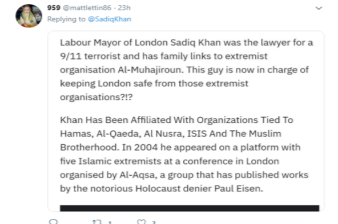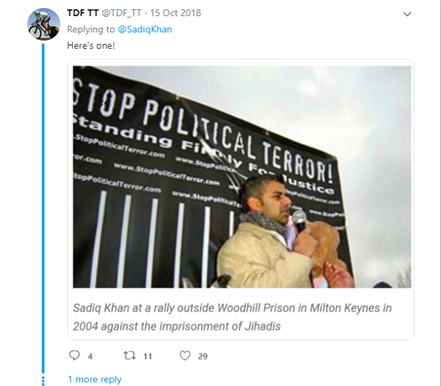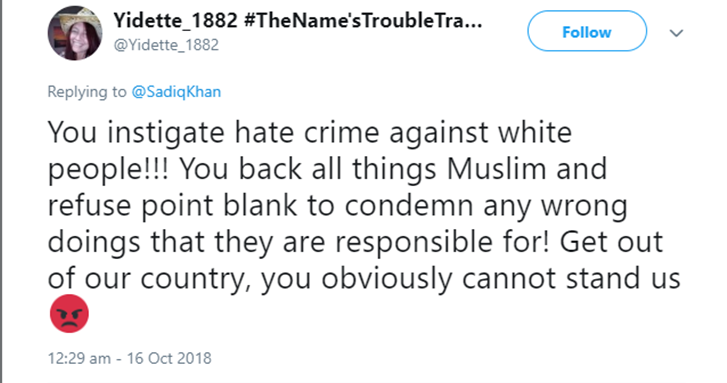Relationship Between Muslims and Non-Muslims in the UK: Twitter Analysis
| ✅ Paper Type: Free Essay | ✅ Subject: Society |
| ✅ Wordcount: 2635 words | ✅ Published: 23 Sep 2019 |
Do the responses to Sadiq Khan’s posts on Twitter reflect the relationship between Muslims and non-muslims in today’s society?

 It is well known that since the terrorist attacks of 9/11 in the United States, the 7/7 bombings in London and then, more recently, the murder of Lee Rigby in 2013, there has been rising racial tensions in the UK with many individuals that identify as Muslim being attacked on the streets and even more being harassed online (Awan and Zempi, 2016). Furthermore, with the emergence of Brexit in the UK, these tensions have become even worse within recent months. It was found by Feldman, Littler, Dack, and Copsey (2013) that at least 39% of the incidents of hate crime reported to Tell MAMA were online (cited in Awan, 2014). It has been reported that many MPs have been receiving abuse online in the wake of Brexit, with mainly the ones being targeted being Muslim or other faiths (Birchley, 2018). As twitter has become a popular way to post and share opinions on events in society there is no surprise that topics such as politics are discussed on this website, as even politicians themselves have Twitter accounts. This essay will explore the twitter account of Sadiq Khan, who is the Mayor of London and who identifies as Muslim, and the responses that he receives from his tweets. While there are many people that support the work that he does in London, there are many people that have problems with his policies, with many people making this known in the replies to his posts. Many of the people that have negatively replied to many of Sadiq Khan’s tweets are mainly Brexit supporters with United Kingdom and English flag Emoji’s in their usernames, suggesting that they see themselves as ‘British’ and would be against anything that was against this view.
It is well known that since the terrorist attacks of 9/11 in the United States, the 7/7 bombings in London and then, more recently, the murder of Lee Rigby in 2013, there has been rising racial tensions in the UK with many individuals that identify as Muslim being attacked on the streets and even more being harassed online (Awan and Zempi, 2016). Furthermore, with the emergence of Brexit in the UK, these tensions have become even worse within recent months. It was found by Feldman, Littler, Dack, and Copsey (2013) that at least 39% of the incidents of hate crime reported to Tell MAMA were online (cited in Awan, 2014). It has been reported that many MPs have been receiving abuse online in the wake of Brexit, with mainly the ones being targeted being Muslim or other faiths (Birchley, 2018). As twitter has become a popular way to post and share opinions on events in society there is no surprise that topics such as politics are discussed on this website, as even politicians themselves have Twitter accounts. This essay will explore the twitter account of Sadiq Khan, who is the Mayor of London and who identifies as Muslim, and the responses that he receives from his tweets. While there are many people that support the work that he does in London, there are many people that have problems with his policies, with many people making this known in the replies to his posts. Many of the people that have negatively replied to many of Sadiq Khan’s tweets are mainly Brexit supporters with United Kingdom and English flag Emoji’s in their usernames, suggesting that they see themselves as ‘British’ and would be against anything that was against this view.
Pictures above show the accounts that were most likely to disagree with Khan’s comments. As it is shown many are supporters of Brexit and have British flags in their usernames
It is argued that Twitter has a ‘strong potential’ to become a place for ‘Sub politics’ that Beck describes as :’politics that are not governmental, Parliamentry, and party politics but take place in all the other fields of society’ (Lindgren and Lundstrom, 2011 and Beck 1997:52 Cited in Fuchs, 2014). This means that people who aren’t necessarily politicians or have no interest in politics can have their say and discuss politics in a way that can be understood and that many people can participate in. Iganski (2012) argued that people may use big public figures like Sadiq Khan in order to gain followers and to maximize their influence among others (cited in Awan, 2014).
One concept that could be used to describe how Muslims are treated online could be due to cultural violence. Cultural violence refers to the practice and beliefs that we have as a society that have been passed down through generations that results in certain groups of people to become marginalised. In this instance, the idea that most Muslims are terrorists comes from the incidents of terrorism that were perpetrated by people that identified as Muslim, and the fact that ISIS is made up of many members that identify as Muslim, has been ingrained in society and therefore people assume that every Muslim is a terrorist or sympathises with terrorists. Therefore people who are perceived as Muslim now have a stigma attached to them that they can’t dispel and this therefore results in them being outcast. Many of the people that replied to Sadiq’s tweets, where they didn’t outright discuss his religious identity, it was implied in many of the comments that he wasn’t to be ‘trusted’ (enigma57, 2018) and many people refered to Sadiq Khan’s past where he was supposedly affiliated with terrorist groups (TDF_TT, 2018 and mattlettin86, 2019). However, as stated in the Living with difference report ‘ online communication makes it easier for information to be distorted or misinterpreted’ (Woolf Institute, 2015: 41-42) , so the information found could be not entirely true, or people could have been misinformed in some way. Furthermore, yet even when the Sadiq Khan’s tweets are not related to religion individuals still find a way to mention his culture and religion as if it is something that he subscribes to and practices these things daily. For example, When Sadiq Khan tweeted about breast cancer, there was one user that pointed out that his ‘religion endorses breast ironing’ and accuses Sadiq of not being genuine in his support of those suffering from breast cancer, perhaps suggesting that Sadiq condones this the act of breast ironing despite having no evidence to support this (sinkaspud, 2018).


These pictures show users referring to Khan’s past.
It is clear that by looking at the responses to many of Sadiq Khan’s tweets that many people lack the religious literacy needed to understand that not everyone experiences religion in the same way and therefore shouldn’t assume that everyone that belongs to the same culture has the same shared ideas (The Religious Literacy Project, 2019). Many people that reply to Sadiq Khan’s tweets lack the understanding of religion and seem to believe that religious writings are law and therefore people that belong to this religion cannot deviate from these rules. It is important that we all possess religious literacy so that we have the correct understanding of what religion is so that we can understand more about the religions that exist in society so that misunderstandings and stigmatisation does not occur, like it has with the Muslim community. Many people that responded to Tweets that concerned reducing hate crime did not seem to understand that hate crime did not just mean the use of ‘unkind words’ or ‘hurty words’ (HandsDot, 2018 and CatzPurrington, 2018). Many people chose to assume that hate crime is defined as people that say offensive words to another person, when otherwise it can be any form of crime committed against any person because of characteristics such as race, gender or sexuality (Metropolitan Police, 2019). Another person, when replying to the Tweet about hate crime accused Khan of ‘instigating hate crime against white people’ due to the idea that supports ‘all things Muslim’ (Yidette_1882, 2018) which seems to suggest that when Khan tries to support those who may be marginalised by society, some people assume that he doesn’t ‘like’ white people (Yidette_1882, 2018).

However, even though there are many people that are posting negative comments, there are many people that find his influence on London positive. For example, one twitter user replied to a tweet of Sadiq Khan claiming that the only reason that he only likes Khan’s tweets was due to the fact that he is ‘Pakistani’ and Muslim. When asked if he would still like the tweets if Khan was not ‘Pakistani’, the user replied that he ‘wouldn’t even follow the Mayor of London’ (AhmedInzy, 2018 and carole136, 2018). This shows that even though Khan is receiving passive aggressive comments about his religion, he is providing a positive model for those who are feeling marginalised by the recent political climate that the UK is currently in. This also suggests that Khan’s twitter account brings those who wouldn’t necessarily follow politics because they feel as though they not thoroughly represented, nevertheless, having mayor that represents a culture that is largely marginalised in society, it could be argued that it would encourage those who feel this way to be more active in politics.
It could be believed that the replies to Sadiq Khan’s tweets reflect the social conflict that is prevalent in today’s society. Attacks against Muslim people and people who are ‘visibly’ Muslim (Awan and Zempi, 2016) have become a common occurrence in society recently and people are using their digital citizenship to reinforce these ideas to a winder range of the public and come together. When looking at the replies to the Tweets of Boris Johnson, the former Mayor of London, from the time when he was the Mayor of London in 2015 and although he did have his fair share of negative comments, they were few and far in between. However, none of the comments that could be found were related to religion. It could be argued that this is because Boris Johnson is white and therefore the majority of people that have a problem with Sadiq Khan would not have a problem with Boris Johnson. However this is before the Brexit campaign so therefore racial tensions were not at the forefront of society’s problems.
After the attack on a synagogue in Pittsburgh, Khan Tweeted his solidarity to the Jewish community but also reiterated the idea that ‘places of Worship should be sanctuaries and safe places’ (SadiqKhan, 2018). After this tweet, many people decided to point out that many in Mosques that have been raided in the past there have been found many weapons, which again brings up Khan’s religion yet again. Could it be argued that users are pointing this out because Khan is a Muslim himself and are suggesting that he condones these acts of terrorism?
It could also be argued that the concept of banal religion could be applied to the data found. This concept could be applied as many people on social media, and in society in general, taken everything that would be deemed as sacred in the Muslim religion and turn it into something about terrorism. In this way, ultimately, when people then think about the Muslim religion they will automatically link it to terrorism, which is not the ideology of Muslims. Nevertheless, people automatically link the two together even if the have no evidence.
With the fast development of technology, there comes a huge development in the means of social media. There are greater numbers of people that own smartphones and more often than not, those people belong to social media sites. As these technologies have become portable, so has social media as now people are able to report on things they see on the go and are able to see things that other people have posted anywhere they want. Social media has often been praised by people as it gives the chance for people from different backgrounds from expressing their own opinions on things that are happening in society, whether they be good or bad. However there are limits to this as there are some parts of the world that cannot gain access to the internet and so their opinions and thoughts are unable to be heard. There are also people that don’t read English, and as most of what is on the internet is written in English some people may not be able to understand what is written on social media so therefore their view cannot be shared with those who speak English, plus they cannot understand the view of those that speak English. Furthermore, in the report Living with Difference, it is understood that people of social media platforms are more likely to engage with people that have the same ideas and views as them so therefore they are more likely to be blind to those that have different views (Woolf Institute, 2015:41-42). Therefore this suggests that it doesn’t matter that there are different opinions on matters in society if we are more inclined to surround ourselves with like-minded people we are unlikely to see these different views.
In conclusion, it could be argued that the replied to the Tweets of Sadiq Khan reflect the precarious relationship between society and those who identify as Muslim. This is seen through the many replies to Khan’s tweets that do not relate at all to his religion, it is commented upon in the replies to his tweet’s either subtly mentioned or more obviously stated by those. Even though his religion is mentioned in many of the replies, through the research that was carried out there was very little evidence to Khan mentioning his own religion in his own tweets, he mainly focusses the subject of his tweets on the current issues that are currently prevalent in London and around the UK such as hate crime, Brexit and the Air pollution in London. Moreover, when Khan does mention culture or religion many people accuse him of ‘ignoring’ white people (Long8Bob, 2018) and are still accusing him of supporting ‘extremism’ (poli_tech_al_87, 2018). It is unclear as to whether the negative reaction towards Sadiq Khan’s Twitter posts is only because people feel as though he is not doing the best job as Mayor or whether it is because he identifies as a Muslim, however, evidence shows that being a Muslim may play a part into the negativity that he is faced with whenever he posts something on Twitter.
Bibliography
- Woolf Institute (2015) Living with Difference: Report of the Commission on Religion and Belief in British Public Life. Cambridge: The Woolf Institute. Available online: https://www.woolf.cam.ac.uk/research/publications/reports/report-of-the-commission-on-religion-and-belief-in-british-public-life [Accessed: 10/12/2018]
- Fuchs, C (2014) Social Media: A Critical Introduction. London: Sage Publications Ltd.
- Awan, I (2014) Islamophobia and Twitter: A Typology of Online Hate Against Muslims on Social Media. Policy & Internet, 6(2). Available online: https://onlinelibrary.wiley.com/doi/abs/10.1002/1944-2866.POI364
- Awan, I & Zempi, I (2016) The Affinity Between Online and Offline anti-Muslimism Hate Crime: Dynamics and Impacts. Aggression and Violent Behaviour, 27, 1-8. Available online: https://www.sciencedirect.com/science/article/pii/S1359178916300015
- Birchley, E (2018) MPs Facing Increased Abuse From Online Trolls. Available online: https://news.sky.com/story/mps-facing-increased-abuse-from-online-trolls-11408207 [Accessed: 10/01/2019]
- Enigmma57 (2018) Most of us think you are suspicious [Twitter]. 27 Oct. Available online: https://twitter.com/enigma5700/status/1056269232479129601
- TDF_TT (2018) Here’s one! [Twitter]. 28 Oct. Available online: https://twitter.com/TDF_TT/status/1051870653312393217
- Mattlettin86 (2019) (Picture) [Twitter]. 13 Jan. Available online: https://twitter.com/mattlettin86/status/1084469295634178048
- Sinkaspud (2018) From the bloke of a religion that endorses breast ironing? Excuse me for not fully trusting your authenticity in this message, won’t you? [Twitter] 19 Oct. Available online: https://twitter.com/sinkaspud/status/1053267168652075008
- CatzPurrington (2018) Does hate crime include hundreds of stabbings, acid attacks and countless other VERY hateful crimes? Or just hurty words? [Twitter] 15 Oct. Available online: https://twitter.com/CatzPurrington/status/1051869606552453121
- HandsDot (2018) Sadiq Khan’s London 2018. Getting stabbed, attacked with machetes and hammers, blown up, ran over by vans and doused in acid = This is part and parcel of living in a big city. Having unkind words spoken to you = a heinous crime foe which there can be no tolerance [Twitter]. 15 Oct. Available online: https://twitter.com/HandsDot/status/1051900827508625410
- Yidette_1882 (2018) You instigate hate crime against white people!!! You back all things Muslim and refuse point blank to condemn any wrong doings that they are responsible for! Get out of out country, you obviously cannot stand us [Twitter]. 16 Oct. Available online: https://twitter.com/Yidette_1882/status/1052099171069648897
- AhmedInzy (2018) Bro I only like your tweets, because you’re a Pakistani London mayor. Above all you’re a muslim. Good attribute you have, working hard for the people of London. Keep the good work up. 28 Oct. Available online: https://twitter.com/AhmedInzy/status/1056709037838999552
- AhmedInzy (2018) Not really. I wouldn’t even follow the Mayor of London, to be honest. [Twitter] 28 Oct. Available online: https://twitter.com/AhmedInzy/status/1056724838478499847
- Carole136 (2018) And if he wasn’t Pakistani you wouldn’t like his tweets? [Twitter] 28 Oct. Available online: https://twitter.com/carole136/status/1056716433734938625
- SadiqKhan (2018) Places of worship should be sanctuaries and safe spaces. Tomorrow I will be standing shoulder to shoulder with Jewish Londoners for their Shabbat service to show solidarity to the victims of the Pittsburgh shooting last weekend. #ShowUpForShabbat#PittsburghStrong [Twitter]. 2 Nov. Available online: https://twitter.com/SadiqKhan/status/1058331017197563904
- Long8Bob (2018) Left out the English again [Twitter]. 29 Oct. Available online: https://twitter.com/Long8Bob/status/1056876485531840513
- Poli_tech_al_87 (2019) Everyone knows that you support extremism. We don’t like you. [Twitter]. 14 Jan. Available online: https://twitter.com/poli_tech_al_87/status/1084820440059527168
Cite This Work
To export a reference to this article please select a referencing stye below:
Related Services
View allDMCA / Removal Request
If you are the original writer of this essay and no longer wish to have your work published on UKEssays.com then please click the following link to email our support team:
Request essay removal


